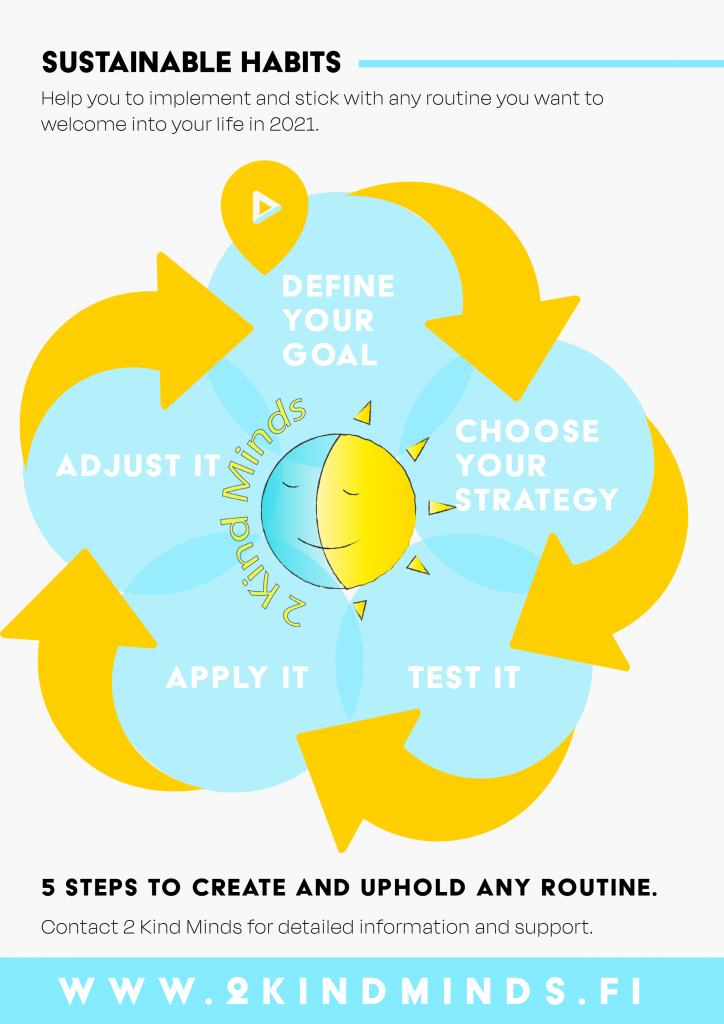
Sustainable Habits benefit your mental Well-being
For many 2020 was a year of big changes and challenges. We had to adjust to changes in social protocols and a switch to mostly technology-based communication, like video calls and messaging apps, we had to find a way to adapt to working from home, despite having no main office space in the house, and the regular chores to take care of. For many the comforting routine of going to the office suddenly ceased. Keeping up the motivation to work all day, while also being surrounded by home’s comforts and family members seemed nearly impossible. Adjusting to all of this, while also maintaining a good mental and physical well-being was and still is an ongoing challenge. Most of us need to acknowledge that getting through the last year is an achievement in itself. That it is okay being still in a transition period. You are in good company. Many, who arrived in 2021, are still looking for the perfect strategy to keep up their mental and physical well-being.
Maybe you have started a variety of new hobbies or aimed for high fitness goals that you dove into enthusiastically for a few weeks, but struggled to maintain them for more than a short period of time.
The question is: What makes a habit sustainable? Sustainable habits are manageable behaviour changes that you have implemented successfully into your daily or weekly routines. You keep them up easily without losing motivation and energy to stick to them.

Here is a short description about how it works:
Define your Goal
Start by taking a good look at yourself, your current lifestyle, your needs and how much time you have to spare. Where do you stand right now?
Continue by setting a bold but realistic goal, you see yourself reaching in the future.
Make a plan that fits in your daily routine right now. Remember to be fair by giving yourself a realistic chance to reach it.
Extra Tip: Include sub-goals!
Defining a sustainable goal usually includes specific characteristics for example a predefined time slot scheduled sub-goals and the reward. Make sure you remember to reward yourself for reaching your sub-goals.
Example: Stay in shape by using an online sports program.
Choose your Strategy
Choose a strategy mindfully. No matter how much others like it. It has to resonate with you, your lifestyle, your timetable, your health and your needs (see: “Define your Goal”).
Extra-Tip: Attach the new habit to an already established, pre-existing one e.g. your morning routine.
Example: Choose your favourite activity for the time and space you have available e.g. Yoga or a HIIT workout.
Test it
Allow yourself a trial period to test your strategy. This will help either way. You will get clear answers to questions like: Is it right for me? Can I motivate myself to keep it up? Is this the time slot I can commit to? Is the time I estimated for it sufficient?
Do not leave this step out. It is important to make sure the routine is suitable to your needs. Once you get it right, you can continue to the next step!
Extra-Tip: “Failing” during this step is not failing, it is learning, experiencing and adjusting the strategy.
Example: Test the program you chose. There are many different programs out there. This is the time to find the right one for you. Using the trial period to test the offer and find out whether you can commit to this program.
Apply it
After the first difficulties and adjustments of the trial period, you know what you commit to and have some options to deal with difficulties.
Now it is time to start following your plan and see how you get on.
Check your sub-goals regularly and set reminders to reward yourself. This may work for a long period of time.
Eventually something will change, which is natural. This could be that your physical condition has improved so much that the routine needs to be adjusted to be challenging again. It may also be that something in your life changes rapidly that requires a bigger adjustment. Then it is time for the next step.
Adjust it
Check regularly how up to date your routine is. Once you realize that circumstances have changed to an extent that bigger adjustments are necessary, try to be proactive and flexible. Change is the natural course of life. Using change to grow by accepting and mastering the challenge is by definition personal development. Try to guide yourself with acceptance through this process of letting go of an unsuitable routine. Allow yourself to gradually adjust according to how easy it is to let go. It may take some time. Even if you feel that something has changed profoundly, there is no need to worry. You know by now how it works! Take your time and start over to create a new suitable and sustainable routine!
From experience we know that our tips work, but there might be obstacles on the way, that might be hard to overcome by yourself. If you would like to receive a bit more guidance you can join our 1-hour workshop this Sunday. During the workshop we are able to help you with your personal goal-setting issues. No time on Sunday? Get in touch with us for a 1-on-1 session and take advantage of focusing on your needs exclusively.